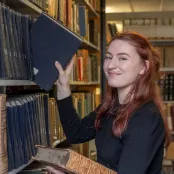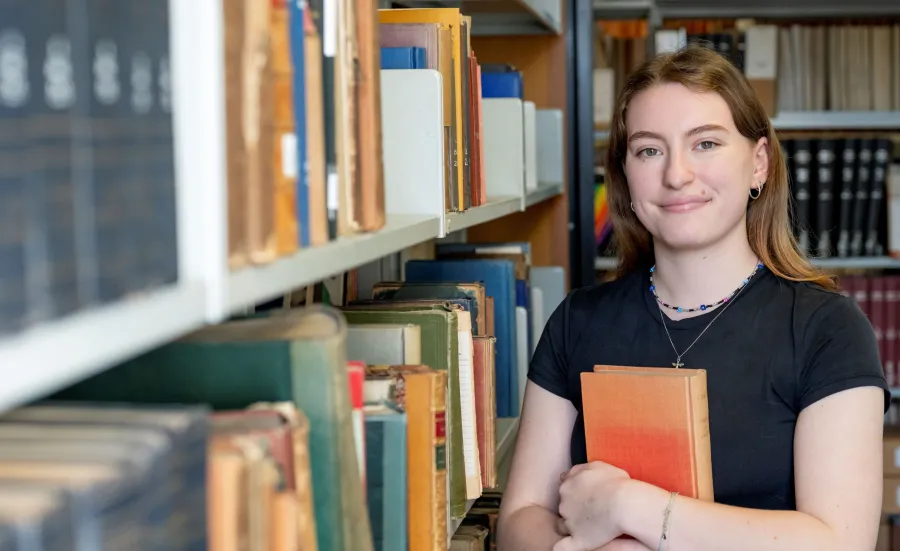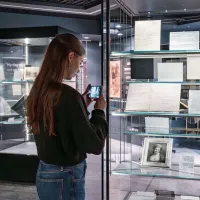About this course
Explore the historical contexts that have given rise to the emergencies of today. You’ll analyse past approaches to global challenges and learn ways to influence attitudes and bring about change.
BOB体育登录网址_欧宝体育官网平台-APP|下载 world faces many challenges, from conflict and sustainability to migration and the preservation of human rights. On this 1-year MA, you’ll engage critically with some of the biggest problems in the world to learn to develop solutions for both now and the future.
You’ll have the opportunity to:
- choose a contemporary challenge and identify and analyse past approaches to addressing it
- share your findings effectively by using data visualisation, writing policy briefs, and creating video content
- use the skills you have developed and collaborate with other students
- take part in an intensive summer school experience that will support the start of your final project portfolio
- study a foreign language or alternative modules from the History MA
Learn how to influence and create change using:
- data analysis to create more effective briefs for policy debates
- data visualisations to create more effective opinion pieces for advocacy
- video essays to create more effective lesson plans for students
- exhibitions and podcasts for better public advocacy
This course will also give you a range of additional skills not normally prioritised within a History MA degree, including data analysis and visualisation, project management, and media communication.
Flexible study
If you prefer, you can apply to study this course as:
- a part-time master's - study the same course content over 2 or more years
Your modules and fees may vary if you choose a different study option.
We regularly review our courses to ensure and improve quality. This course may be revised as a result of this. Any revision will be balanced against the requirement that the student should receive the educational service expected. Find out why, when, and how we might make changes.
BOB体育登录网址_欧宝体育官网平台-APP|下载 courses are regulated in England by the Office for Students (OfS).
Course lead
Your course lead will be Dr Christopher Fuller. He specialises in the study of U.S. foreign policy from 1945 to the present day.
His work bridges the gap between scholars and practitioners with contributions to professional bodies and government agencies, as well as public engagement through documentaries, festivals, and public events.
Study MA Global Challenges - History, Policy, Practice
Learn more about this subject area

My MA programme is designed to investigate current global issues and their history, and then to look at potential solutions. This has been really interesting to study, whilst also giving me insights into the world of policy making and advocacy.
Course location
This course is based at Avenue.
Awarding body
This qualification is awarded by the University of BOB体育登录网址_欧宝体育官网平台-APP|下载.
BOB体育登录网址_欧宝体育官网平台-APP|下载 the Course Description Document
The Course Description Document details your course overview, your course structure and how your course is taught and assessed.
Entry requirements
You’ll need a 2:1 degree in an undergraduate subject.
These would usually be in:
- humanities
- social sciences
- media and communications.
We also welcome applicants who want to complement previous undergraduate degrees in:
- art and graphic design
- physical sciences
- life and environmental sciences.
Find the equivalent international qualifications for your country.
English language requirements
IELTS score requirements
- overall score
- 6.5
- reading
- 6.0
- writing
- 6.0
- speaking
- 6.0
- listening
- 6.0
We accept other English language tests. Find out which English language tests we accept.
If you don’t meet the English language requirements, you can achieve the level you need by completing a pre-sessional English programme before you start your course.
Pre-masters
If you don’t meet the academic requirements, you can complete a pre-master's programme through our partnership with OnCampus. Learn more about the programmes available.
Got a question?
Please contact us if you're not sure you have the right experience or qualifications to get onto this course.
Email: enquiries@southampton.ac.uk
Tel: +44(0)23 8059 5000
Course structure
This is a full-time master’s course. You’ll study for 12 months, from September to the following September. You can also study this global challenges degree part-time over two years.
In the first 9 months (semesters 1 and 2) you’ll study the taught part of your course.
This is made up of modules that everyone on the course takes, and modules we’ll ask you to choose from a list of options. You’ll also study research skills to prepare for your independent project portfolio.
You'll then produce your own independent project portfolio using the skills you've developed to effect change. This will be related to a global challenge and audience of your choice.
Want more detail? See all the modules in the course.
Modules
The modules outlined provide examples of what you can expect to learn on this degree course based on recent academic teaching. As a research-led University, we undertake a continuous review of our course to ensure quality enhancement and to manage our resources. The precise modules available to you in future years may vary depending on staff availability and research interests, new topics of study, timetabling and student demand. Find out why, when and how we might make changes.
For entry in academic year 2025 to 2026
Year 1 modules
You must study the following modules :
Challenge and Change: Independent Project Portfolio
The culmination of your Masters’ degree, this module will provide you with the opportunity to convert your learning into a prospectus for delivering change. Through the Global Challenges in Historical Perspective modules, you have become familiar with a r...
Effecting Change 1: Policy and Advocacy
These modules will focus upon the development of highly transferable practical skills relevant to specific sectors through which change can be affected. In this module we will explore the ways in which history and the humanities can be leveraged to effect...
Effecting Change 2: Education and Public History
These modules will focus upon the development of highly transferable practical skills relevant to specific sectors through which change can be affected. In this module we will explore how public history (e.g. exhibitions, magazines, documentaries, enterta...
You must also choose from the following modules :
Advanced Research Seminar in American History
Within this module, you will have the opportunity to study different areas of American history. This will take place in student-led discussions, which are convened and supported by historians with experience in US history in varied forms. You will identif...
Advanced Research Seminar in Ancient History
Within this module, you will have the opportunity to study different areas of ancient history. This will take place in student-led discussions, which are convened and supported by historians with experience in ancient history in varied forms. You will ide...
Advanced Research Seminar in Medieval and Early Modern History
Within this module, you will have the opportunity to study different areas of early modern history. This will take place in student-led discussions, which are convened and supported by historians with experience in early modern history in varied forms. Yo...
Advanced Research Seminar in Modern British History
Within this module, you will have the opportunity to study different areas of modern British history. This will take place in student-led discussions, which are convened and supported by historians with experience in modern British history in varied forms...
Global Challenges in Context: Conflict and Security
In order to address any contemporary global challenge, it is vital that we understand the roots of the problem and its historical context. This module explores the broad history of conflict, enabling you to place global events within a wider context and c...
Global Challenges in Context: Energy and Environment
In to order address any contemporary global challenge, it is vital that we understand the roots of the problem and its historical context. This module addresses energy and the environment, providing you with a broad overview of the history of energy use i...
Global Challenges in Historical Context: Identity and Rights
In to order address any contemporary global challenge, it is vital that we understand the roots of the problem and its historical context. This module examines human rights and identity by broadly exploring the history of poverty and wealth from antiquity...
Global Challenges in Historical Context: Migration and Asylum
In to order address any contemporary global challenge, it is vital that we understand the roots of the problem and its historical context. This module explores the history of global migration from the ancient world to the present day, considering how and ...
Memory in National and Transnational Contexts
Whether in the form of monuments, stories or rituals a desire to remember seems to be everywhere in most if not all contemporary nation states. In some respect this has been fuelled by the continually evolving international situation, which has posed a se...
Narrative, Place, Identity
This module investigates how cultural narratives have been produced, disseminated and consumed across national boundaries since the mid-twentieth century. Through examination of a range of narrative forms, including fiction, essay, memoir, film and photog...
Nation, Culture, Power
This module offers an in-depth exploration of three concepts that have shaped the modern world: nation, culture, and power. Drawing on staff expertise in cultural and critical theory, the module will investigate the key questions that worldwide thinkers a...
Text as Data
In this module, you will explore one of the primary forms of data used in humanities data science - text! You will develop an understanding of text as a form of data, including what can (and can't!) be do with it. You will explore and compare varying apro...
The Ethics of Climate Change
The climate crisis is one of the most urgent issues facing humanity. Climate change is having an increasing impact on individual lives, and on social and political relations and institutions. This module examines the moral and political philosophical issu...
Themes in American History
This module draws upon the expertise of three US historians to explore different dimensions of the American past, from the founding of the republic forward. This year, we will be focusing on the theme: ‘The other among us: conspiracies, cults and counterr...
Themes in Medieval and Early Modern History
In this module, you will explore some of the social, cultural and political forces that transformed the medieval and early modern worlds. This was a period of momentous change characterised by invasion, political upheaval, religious conflict and a rapidly...
Themes in Modern British History
Historians have become interested in ‘ordinary people’ in recent years. Why? This module explores this question through looking at case-studies of women’s, men’s and children’s histories in nineteenth- and twentieth-century Britain, and at varieties of ‘o...
Themes in the Ancient World
Ancient history covers a vast geographical and chronological span, from Ancient Egypt to Classical Greece, from Rome to Imperial China, and from the Mediterranean into Europe, Africa, and the Near East. This module allows you to explore your interest in t...
Transnational Movement in the Age of Globalisation
The module investigates transnational approaches to migration, global mobility and diversity. It combines theoretical approaches with empirical case studies and methodological issues.
Learning and assessment
Learning
We teach you through a mixture of:
- lectures
- seminars
- skills workshops
- practitioner workshops
- final project summer school
Assessment
We'll assess you through a combination of:
- independent project portfolio
- assessed essays
- video essays
- podcasts
- policy briefs
- media article
- lesson plan
- exhibit plan
Academic Support
We’ll assign you a personal tutor, and you’ll have access to a senior tutor.
Careers and employability
Employability skills
This degree will allow you to develop and evidence subject-specific and targeted employability skills. This includes the required skill set for a range of future careers, further study, or starting your own business.
The skills you can expect to focus on and gain from this course include:
- Research
- Critical thinking
- Self-management
- Communication
- Teamwork
- Creativity
- Networking
- Problem solving
The employability and enterprise skills you'll gain from this course are reflected in the BOB体育登录网址_欧宝体育官网平台-APP|下载 skills model. When you join us you'll be able to use our skills model to track, plan, and benefit your career development and progress.
BOB体育登录网址_欧宝体育官网平台-APP|下载 skills overview
Career pathways
Graduates commonly work in a range of organisations or sectors including:
Local government,
national government bodies,
regional councils,
museums,
Libraries,
universities,
schools,
colleges,
tourism,
heritage service providers,
charitable organisations.
- Data analyst
- Project manager
- Data visualisation specialist
- Journalist
- Media communication executive
- Heritage manager
- Archivist
- Social researcher
- University lecturer
- Secondary school teacher
- Solicitor
- Librarian
- Marketing executive
- Media researcher
- Information officer
- Archives assistant
- Human resources specialist
- Secondary school teacher
- Tax assistant
- Assistant archaeologist
- Marketing executive
- Primary school teacher
- Recruitment consultant
- Civil servant
- Trainee solicitor

Work experience opportunities
Choosing to do work experience is a great way to enhance your employability, build valuable networks, and evidence your potential. Learn about the different work and industry experience options at BOB体育登录网址_欧宝体育官网平台-APP|下载.
Careers services and support
We are a top 20 UK university for employability (QS Graduate Employability Rankings 2022). BOB体育登录网址_欧宝体育官网平台-APP|下载 Careers, Employability and Student Enterprise team will support you. This support includes:
- work experience schemes
- CV and interview skills and workshops
- networking events
- careers fairs attended by top employers
- a wealth of volunteering opportunities
- study abroad and summer school opportunities
We have a vibrant entrepreneurship culture and our dedicated start-up supporter, Futureworlds, is open to every student.
Your career ideas and graduate job opportunities may change while you're at university. So it is important to take time to regularly reflect on your goals, speak to people in industry and seek advice and up-to-date information from Careers, Employability and Student Enterprise professionals at the University.
Fees, costs and funding
Tuition fees
Fees for a year's study:
- UK students pay ?9,250.
- EU and international students pay ?25,400.
What your fees pay for
Your tuition fee covers the full cost of tuition and any exams. The fee you pay will remain the same each year from when you start studying this course. This includes if you suspend and return.
Find out how to pay your tuition fees.
Accommodation and living costs, such as travel and food, are not included in your tuition fees. There may also be extra costs for retake and professional exams.
Explore:
BOB体育登录网址_欧宝体育官网平台-APP|下载 Arts and Humanities Deans Global Talent Scholarship
40 scholarships of ?10,000 each are available to international students studying for an undergraduate degree or a postgraduate master’s degree in Arts and Humanities.
Find out more about the BOB体育登录网址_欧宝体育官网平台-APP|下载 Arts and Humanities Deans Global Talent Scholarship, including eligibility, deadlines and how to apply.
Other postgraduate funding options
A variety of additional funding options may be available to help you pay for your master’s study. Both from the University and other organisations.
Funding for EU and international students
Find out about funding you could get as an international student.
How to apply
- Use the blue 'apply for this course' button on this page to take you to our postgraduate admissions system.
- Create an account which gives you access to your own application portal. .
- Search for the course you want to apply for.
- Complete the application form and upload any supporting documents.
- Pay the ?50 application assessment fee, (there are some exemptions, check terms and conditions).
- Submit your application.
For further details of our admission process, read our step by step guide to postgraduate taught applications.
Application deadlines
- International students: Tuesday 26 August 2025, midday UK time
- UK students: Tuesday 9 September 2025, midday UK time
Application assessment fee
We’ll ask you to pay a ?50 application assessment fee if you’re applying for a postgraduate taught course.
This is an extra one-off charge which is separate to your tuition fees and is payable per application. It covers the work and time it takes us to assess your application. You’ll be prompted to pay when you submit your application which won’t progress until you've paid.
If you're a current or former University of BOB体育登录网址_欧宝体育官网平台-APP|下载 student, or if you’re applying for certain scholarships, you will not need to pay the fee. PGCE applications through GOV.UK and Master of Research (MRes) degree applications are also exempt. Find out if you’re exempt on our terms and conditions page.
Supporting information
When you apply you’ll need to submit a personal statement explaining why you want to take the course.
You’ll need to include information about:
- your knowledge of the subject area
- why you want to study a postgraduate qualification in this course
- how you intend to use your qualification
References are not required for this programme.
Please include the required paperwork showing your first degree and your IELTS English language test score (if you are a non-native English speaker) with your application. Without these, your application may be delayed.
What happens after you apply
You'll be able to track your application through our online Applicant Record System.
We will aim to send you a decision 6 weeks after you have submitted your application.
Unfortunately, due to number of applications we receive, we may not be able to give you specific feedback on your application if you are unsuccessful.
Equality and diversity
We treat and select everyone in line with our Equality and Diversity Statement.
Got a question?
Please contact us if you're not sure you have the right experience or qualifications to get onto this course.
Email: enquiries@southampton.ac.uk
Tel: +44(0)23 8059 5000


